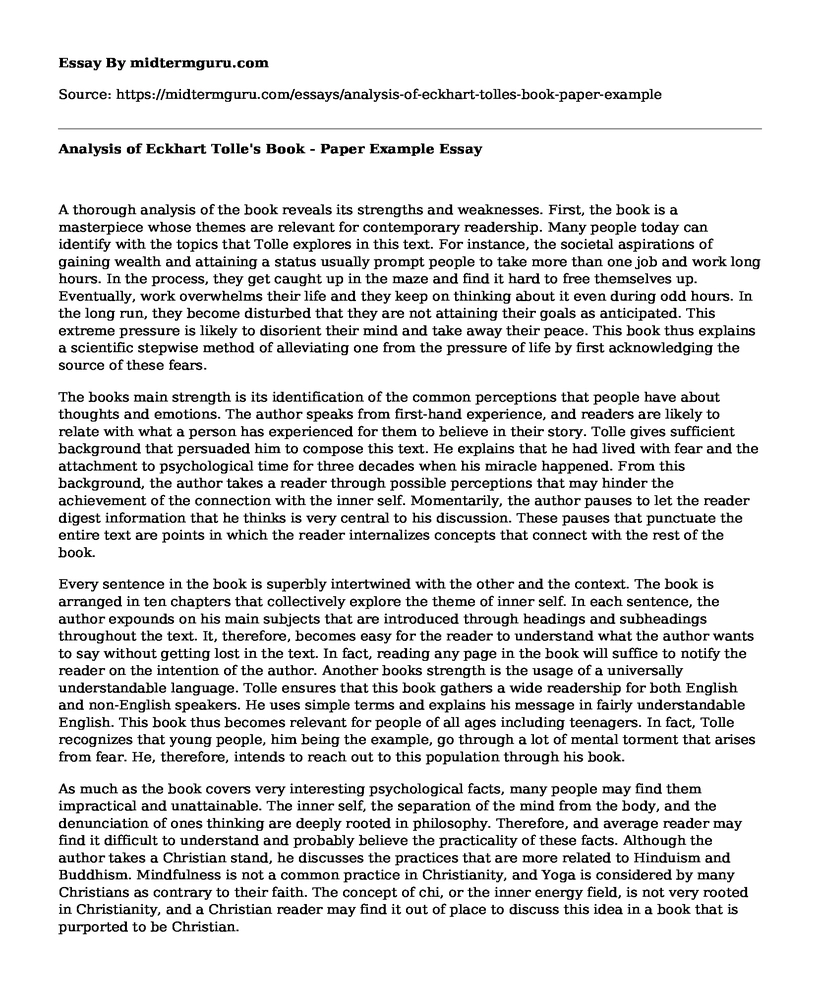A thorough analysis of the book reveals its strengths and weaknesses. First, the book is a masterpiece whose themes are relevant for contemporary readership. Many people today can identify with the topics that Tolle explores in this text. For instance, the societal aspirations of gaining wealth and attaining a status usually prompt people to take more than one job and work long hours. In the process, they get caught up in the maze and find it hard to free themselves up. Eventually, work overwhelms their life and they keep on thinking about it even during odd hours. In the long run, they become disturbed that they are not attaining their goals as anticipated. This extreme pressure is likely to disorient their mind and take away their peace. This book thus explains a scientific stepwise method of alleviating one from the pressure of life by first acknowledging the source of these fears.
The books main strength is its identification of the common perceptions that people have about thoughts and emotions. The author speaks from first-hand experience, and readers are likely to relate with what a person has experienced for them to believe in their story. Tolle gives sufficient background that persuaded him to compose this text. He explains that he had lived with fear and the attachment to psychological time for three decades when his miracle happened. From this background, the author takes a reader through possible perceptions that may hinder the achievement of the connection with the inner self. Momentarily, the author pauses to let the reader digest information that he thinks is very central to his discussion. These pauses that punctuate the entire text are points in which the reader internalizes concepts that connect with the rest of the book.
Every sentence in the book is superbly intertwined with the other and the context. The book is arranged in ten chapters that collectively explore the theme of inner self. In each sentence, the author expounds on his main subjects that are introduced through headings and subheadings throughout the text. It, therefore, becomes easy for the reader to understand what the author wants to say without getting lost in the text. In fact, reading any page in the book will suffice to notify the reader on the intention of the author. Another books strength is the usage of a universally understandable language. Tolle ensures that this book gathers a wide readership for both English and non-English speakers. He uses simple terms and explains his message in fairly understandable English. This book thus becomes relevant for people of all ages including teenagers. In fact, Tolle recognizes that young people, him being the example, go through a lot of mental torment that arises from fear. He, therefore, intends to reach out to this population through his book.
As much as the book covers very interesting psychological facts, many people may find them impractical and unattainable. The inner self, the separation of the mind from the body, and the denunciation of ones thinking are deeply rooted in philosophy. Therefore, and average reader may find it difficult to understand and probably believe the practicality of these facts. Although the author takes a Christian stand, he discusses the practices that are more related to Hinduism and Buddhism. Mindfulness is not a common practice in Christianity, and Yoga is considered by many Christians as contrary to their faith. The concept of chi, or the inner energy field, is not very rooted in Christianity, and a Christian reader may find it out of place to discuss this idea in a book that is purported to be Christian.
One of the major weaknesses of the book is that the author was inspired by the joy he attained not from his own efforts but through a spontaneous occurrence. For 29 years, Eckhart Tolle lived in fear until when a miracle happened one night. Ironically, he does not tell his readers to anticipate for a miracle, but rather urges them to practice mindfulness to achieve what he did through a miracle. In the prologue of this book, Tolle describes how he was convinced to not resist anything. He afterwards fell into a deep sleep from which he awoke with unexplainable bliss. Therefore, a portion of readers may feel that Tolle is asking them to try procedure that did not bring happiness to himself, or the ones that he has not tried. In fact, the reader may isolate his experiences from the rest of the text, and find no relationship between mindfulness and Tolles personal experience of easiness.
Mindfulness and meditation are popular practices of alleviating psychological pain and attaining spiritual fulfillment. In a book titled The Power of Now, Eckhart Tolle theorizes that fear stems from the struggle of living in the future, which is in turn rooted in negative thoughts. Becoming a witness of ones thoughts is an important step towards spiritual fulfillment. Tolle, in this bestselling masterpiece reaches out to very many people of diverse characteristics. However, there is an apparent disconnect between what the author recommends and what was actually his source of happiness. Nonetheless, any reader will find this book practical and informative in their journal towards discovering their inner self.
Cite this page
Analysis of Eckhart Tolle's Book - Paper Example. (2021, Jul 02). Retrieved from https://midtermguru.com/essays/analysis-of-eckhart-tolles-book-paper-example
If you are the original author of this essay and no longer wish to have it published on the midtermguru.com website, please click below to request its removal:
- Essay on Exploring the Character of Desdemona: What Does She Represent?
- Analysis of William Shakespeares Tragedy Othello - Paper Example
- Rue by Philip Levines - Poem Analysis Paper Example
- A Step Away From Them by Frank O'Hara Poem Analysis
- Essay on Downfall of Major Characters in Flannery O'Connors Short Stories
- Comparison Between "The Passionate Shepherd to His Love" and "The Nymph's Reply to the Shepherd"
- Compare and Contrast Essay on Birk and Ciardi Translations of Dante's Inferno







